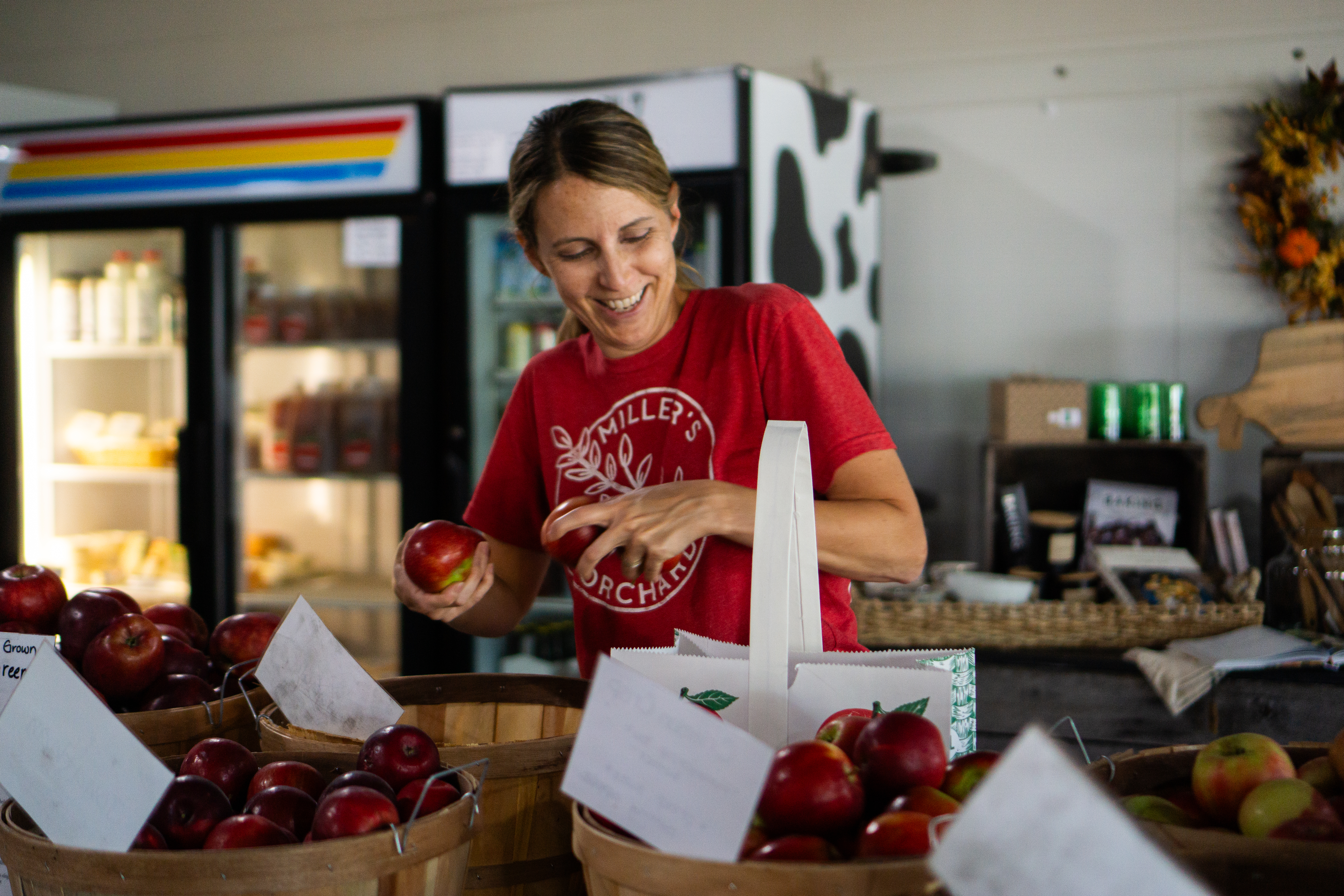Editor’s note: This article was adapted from an Expository Writing class last May Term. Nikki Beer, the owner of Miller’s Orchard, is a first cousin to the author.
In the southwest corner of Nappanee, a small town about thirty minutes outside of Goshen, a rustic wooden building trimmed with green is nestled beside a border of towering trees and a simple white picket fence. Behind the building, a large expanse of vibrant green stretches toward the road. Dotted amongst the grass are rows of small, spindly trees, numbering almost 500 in total.
The apple trees planted in Miller’s Orchard are still much too young to produce any fruit. Nikki Beer, co-owner of the orchard, described the barely one-year-old trees as “puny little sticks.” She explained that the new trees were planted to replace ones that had to be ripped out due to age and years of neglect. This was not an easy decision, and Beer and many others in the community were saddened by it, as it meant, at least for a few years, that the orchard would have no fruit-bearing trees and would have to source their apples from elsewhere.
“I know they won’t always look that way,” she said. “Even the ones we planted from last year to this year are bigger and stronger and more beautiful, but it just takes time.”
When Beer and her husband Jake bought the orchard in 2020, their goal was to restore and revitalize the orchard grounds and accompanying market to its original beauty and prosperity. Beer was inspired to do so by the work of her grandparents, the original owners of the orchard, who helped build the business from the ground up and increase its impact on the community.
In 1958, Harley and Mary Miller bought the orchard grounds in Nappanee, producing and selling apple butter and fresh cider for the next six decades. In the 1970s, Harley and Mary’s apple products replaced onions to form the basis of a town-wide festival. Now, having recently completed its 47th year in September, the Nappanee Apple Festival, according to its website, draws over 80,000 visitors annually and is a weekend-long celebration of community, tradition and, of course, apples.
Though the treats are delicious, Beer seems to think that it was the actions of her grandparents that cemented the lasting impact of Miller’s Orchard on the community. When she returned to Nappanee in the wake of her grandmother Mary’s death in 2008, Beer was overwhelmed by the community’s response.
“Hearing all the stories and stories and stories of what Grandma did and how she poured into people,” Beer said, “it became very clear that the orchard was more of a mission field than it actually was anything to do with business itself.”
Though the orchard and the Millers had impacted generations of visitors, the increase in popularity of chain grocery stores and fears about unpasteurized cider had drastically decreased business. The orchard began to struggle financially, forcing the Millers to close the market and sell off 15 acres of land. By the time Harley died in 2011, Beer and others had begun to wonder “what’s going to happen to this place?”
It was this question and her grandmother’s death that first inspired Beer to pursue possibly purchasing the orchard. Prior to 2008, Beer had never even considered moving back to Nappanee — much less inheriting the family business. However, the way Beer speaks about this experience divulges that her decision went much deeper than surface-level passion or interest.
Beer vividly remembers the moment her life trajectory seemed to pivot. “I remember having this vision sitting in church one day where the Lord grabbed my hand and he said, ‘I have something for you. It is not this,’” she said. “I would say that’s when the orchard got laid on my heart for the first time.”
Beer’s strong faith is an underlying theme throughout her story. Her commitment to following God’s plan and calling for her life is the reason she persisted through 12 years of self-described uncertainty and disappointment, in which she failed to buy the orchard several times due to financial issues and family disagreement. Beer defines those 12 years as a “really tumultuous time” when she experienced a lot of doubt and confusion. She had begun to believe that she was being called home because of the orchard and did not understand why things weren’t working out.
In hindsight, though, Beer has realized the purpose of those years: “I know that over that decade’s worth of time, the Lord had a lot of chipping of my heart and refinement that he wanted me to walk through, to break me of pride and arrogance. If I was going to do this, and if it was going to be as God-honoring as what it was when Grandma and Grandpa were running it, then there were some things that I needed to learn.”
Though Beer believes God played a part in the waiting years, she also witnessed His hand when her dream finally came to fruition. In October 2019, Beer received an anonymous letter.
Beer recounted that part of the letter said “I am for you. Be patient, and I will come after. I have all the things in place, and you will be in awe of my plan and my purpose.’” Beer’s words broke slightly as she read, “And it was signed, ‘the Lord put this on my heart this morning. I don’t know what it means, but perhaps you do.’”
Unexpectedly, two months later, Thomas and Linda Mast, lifelong friends of the Millers, would offer Beer and her husband the opportunity to buy the orchard. Having bought several land plots from Harley while he was alive, Thomas and Linda got wind of the Beers’ interest in the orchard and decided to buy it all back to give the couple the chance to fulfill their dreams.
“It was just like, ‘what? Are you kidding me?’” Beer said. “Because of the way everything transpired, it became very obvious that the Lord’s hand was in it and why that was important.”
In the time since the orchard opened in September 2020, Beer has experienced many things she never expected, such as the impact the market seemed to have on people the minute they stepped through the door. Beer often witnessed people standing silently or even crying because of the memories the place held.
Because of this, Beer is determined to carry on her grandparents’ legacy. “I want to respect what the orchard meant to people,” she said.
Beer was also surprised by how reopening the orchard healed and brought her family together. “I never thought that the Lord would reconcile the family the way he did, but he did,” she explained. “He’s called everybody back home. There’s a heartbeat down there again.”
Just like her grandparents, Beer hopes for the orchard to be a blessing to the community. One of the ways she does this is by prioritizing and supporting other local businesses and carrying their goods in the store.
“What we’re all about is the local farmer or the local artisan,” she explained. “Dad was very adamant when he had the store that the produce come from local people, when it can.”
When asked if the challenges of running a business are worth it, Beer wholeheartedly confirms that it is. “I know without a shadow of a doubt that this is what I’m called to do, right now,” Beer said. “And it’s hard, but it’s worth it. It’s really worth it.”
Beer is far from where she ever expected to be.“I was always going to be an attorney,” she said. “I was going to do work in a city and definitely not be a farmer with an orchard doing what I’m doing.” If Beer had followed her original plan, she would not have encountered the challenges and confusion that she did, but she also would not have found the joys in community and the value in service and connection.
“I always remind people to hold your life with an open hand, because my ‘nevers’ have become my biggest joys,” she said.
“I wasn’t called here to make a pile of money; I was called here to love and serve people,” Beer said. “It’s about remembering to do that, whatever that looks like.”




